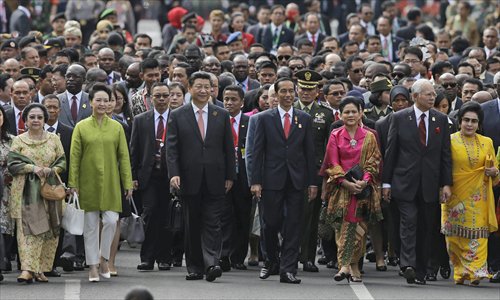HOME >> WORLD
Asian, African leaders unite in historic walk
Source:Xinhua Published: 2015-4-24 23:23:02
60th anniversary of Bandung Conference renews spirit of cooperation

Asian and African leaders, including (front row left to right) chairwoman of the Indonesian Democratic Party-Struggle Megawati Sukarnoputri, Chinese First Lady Peng Liyuan, Chinese President Xi Jinping, Indonesian President Joko Widodo, his wife Iriana Widodo, Malaysian Prime Minister Najib Razak and his wife Rosmah Mansur walk down the street during ceremonies marking the 60th anniversary of the Asian-African Conference in Bandung on western Java island on Friday. Photo: AFP
Chinese President Xi Jinping joined Asian and African leaders and delegates from some 100 countries on Friday morning in a symbolic stroll to commemorate the 60th anniversary of the historic 1955 Asian-African Conference, followed by the signing of a Bandung Message to revitalize Asian-African partnership.
A group of Asian and African leaders walked along the 50-meter-long street, between the Savoy Homann hotel and the Gedung Merdeka, "Independence Building," the same that Asian-African leaders at the first summit in 1955 walked from their residence to the meeting venue.
Hosting Indonesian President Joko Widodo called for Asian and African countries to continue work toward prosperity by echoing the "Bandung spirit" and forging partnerships based on equality.
The spirit of Bandung, which highlighted solidarity, friendship and cooperation, will bring benefits to ordinary people, Widodo said.
Citing inadequate representation of Asian and African countries in the world's multilateral system, Zimbabwean President Robert Mugabe stressed that "time has come for us to revive the spirit of Bandung" in order to more effectively push the development agenda of the global South.
Mugabe said that the China-spearheaded Asian Infrastructure Investment Bank displays the voice of the South.
Mugabe also tried to draw attention to the fact that trade flows between Asia and Africa have increased rapidly, but remain highly imbalanced.
One of the major factors accounting for the huge imbalance is the Asian-African trade pattern, in which Africa's exports are dominated by raw commodities and imports by manufactured goods.
"We can and must correct this unsustainable situation," he said, stressing that African countries have decided to transform their economies through resource-based, value-added industrialization programs and projects.
This economic transformation agenda "offers immense opportunities for deeper cooperation between our countries" through investment and technology transfers, among other exchanges, Mugabe said.
Venezuelan Vice-President Jorge Arreaza said that Asia and Africa should also unite with Latin America and the Caribbean countries to fight neo-colonialism.
"Economically we must never walk alone, we must do it together as a strong bloc, and assist other small countries in achieving independence, not only politically, but also economically," he said.
Representatives of Asian and African leaders also signed the 41-item Bandung message to revitalize Asian-African partnership, aiming to achieve sustainable development.
Posted in: Africa, Asia-Pacific